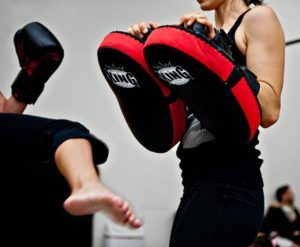Change Skill is introducing a new, opt-in workstream for fighting Tai Chi training, open to anyone whether or not they are students of Tai Chi, so long as they are fit to train. Format is bi-weekly 1 hour sessions at $10 (included in class fee for regular students).
Background
Practical Tai Chi Chuan is well-known for training as a martial art, and has produced full contact fighters across various formats (Sanda/Sanshou,/Lei tai, Vale tudo / different cage fighting). Most students do not wish to train in this way, and normal classes do not oblige them to – standard class formats include some light conditioning and one-step sparring, but not the kind of training required to actually use the art for fighting. Dan Docherty uses a separate

program for this, and Change Skill school of Practical Tai Chi Chuan plans to do something similar.
Key point – this training is not about Tai Chi Chuan, it is about fighting. Many technical areas, such as ground-fighting, or high kicks, are absent or understated in Tai Chi Chuan. This means they need to be trained, where possible, requiring people to contribute with the requisite skills.
This also means that this training is open to participants of all and any style, where experienced participants can help supervise and lead training. This is a training format I have successfully run in the past, where participants can cross-pollinate skills and ‘external’ participants teach techniques and training alongside everyone else.
Training session format
(At least to start with)
1 hour sessions hosted ‘inside’ the regular Change Skill classes (2-3 times weekly)
Format and contents depends on who is there on any given day
Bring a towel and water, and any equipment you may need (see below)
Training Components
Note – not all participants needs to undertake all training components – for example, you may only want to work on conditioning and patterns, with no sparring and limited pushing hands.
Conditioning
Roughly 50% of session time
Aerobic and anaerobic, varying intensity
Example exercises: continuous rolls / breakfalls, focus mitt and punching weight training, jump/duck staff, ‘retrieving the moon from the sea’, stretching & kicks, handstands (on fists), …
Patterns

Two-step sparring (attack-response-counter)
Kick-strike-grapple-throw routines to enable fast and powerful combinations
Combine with conditioning training – eg. Continuous throws
Push hands
Moving step format in determined area
Use of techniques including throws, sweeps and takedowns (any, none or all)
Adaptation to include non-push hands techniques and protections (ie. gloves, etc.)
Sparring
Contact sparring with full protection required (see equipment below) – light contact with limited headstrikes
Sparring drills and exercises (eg. One hand only, kicks vs. hands, mandatory throws, …)
Information for Participants
For legal reasons, all participants must be enrolled in Change Skill schools (at no cost). Please note this covers Change Skill for liability, but participants may want to ensure they have adequate medical insurance, just in case.
All participants must provide a doctor’s certificate signing off fitness to participate in full contact martial art training.
All participants must respect each other, the training, and the supervisors.
Non Change Skill participants are free to participate on the above conditions, at a session fee of $10, whatever role (training, teaching, supervising, etc.) – just like everyone else.
Sessions continue throughout the year, following Change Skill calendar, with a break over Christmas.
Equipment
Change Skill provide most equipment for conditioning (matts, focus mitts, staffs, hand weights, etc.), but more personal items are for individual participants to bring, and people can participate in different activities according to the equipment they have (eg. Gloves and headguards are mandatory for sparring). The following is generally required.
Closed boxing gloves (not MMA style open mitts) – training style (ie. heavier and softer)
Headguard (with or without face visor)
Toothguard
Groin protector
Other protections may be required (Eg. Breast guard for women, shin guard, elbow/knee pads)
Session supervision
All sessions must be supervised by a competent, trained individual with appropriate qualifications (KWA/NCAS, First aid, etc.).
A supervisor should not be actively training, depending on the activity. For more risky training such as free sparring, throw and strike patterns, etc., supervisors must control and visually check participants.